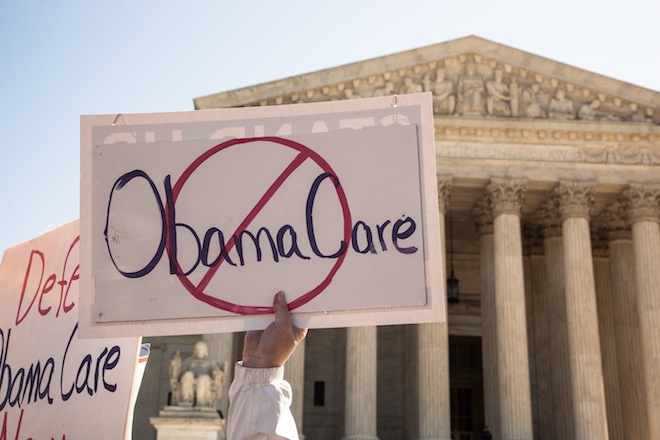If the Republican Party gets its way, it will repeal President Obama’s health care law wholesale. Mitt Romney’s committed to repealing it, as are the party’s congressional leaders and rank-and-file members on Capitol Hill. That’s the plan if they win big in November — unless the Supreme Court beats them to the punch and overturns the entire law.
According to the Democratically-appointed public trustee of the Medicare program, that wouldn’t just spell doom for “Obamacare,” but for Medicare and the entirety of the country’s ailing health care system.
“I’m not saying so much that I think the policies in the Affordable Care Act are the right ones or great ones — but should the court overturn the whole thing … or should the election be won in which this is a big issue and as a result of the outcome the winning party decides it has to gut the thing, what will happen is the momentum, which is disorganized but seems to be all moving in the right direction, will not just slow to a crawl but shift into reverse,” said economist and former Urban Institute President Robert Reischauer, speaking on a panel at the conservative American Enterprise Institute.
Reischauer said a confluence of government and private-sector activity are, in a self-reinforcing way, moving the country’s health care system in a more sustainable direction. A big reason for this, he noted, is the steps the government is taking to implement the Affordable Care Act.
On top, and perhaps in part as a result of that, health care cost growth has slowed dramatically in recent years.
“[F]or the last three years health care costs — whether it’s national health expenditures or Medicare — have been lower than people expected,” Reischauer said. “Something’s going on, and you can attribute only so much to the weakness of our economy. That would have shown up with vengeance much earlier and it wouldn’t have been as sustained as this seems to be.”
But all of that would change if the health care law disappears — and Medicare would sustain the most immediate collateral damage. The demise of the health care law would have scores of consequences for Medicare — including by dramatically hastening the moment at which the program will exhaust its hospital insurance trust fund. The health care law has not only begun the slow process of reforming health care delivery in the private sector, it also rewrote the laws authorizing Medicare to reimburse providers.
As NPR reported, the full dissolution of the health care law would by consequence eliminate that authority.
“Hospitals might not get paid. Nursing homes might not get paid. Doctors might not get paid. Changes in coverage that have begun to take effect for the elderly, closing the doughnut hole might not happen. We don’t know,” George Washington University health law professor Sara Rosenbaum told NPR.
Congress could pass stop-gap measures to assure payments continue, as they do with physician payments in the so-called “doc fix.” But, according to Gail Wilensky, who administered Medicare under President George H.W. Bush, “This would be much bigger,” she told NPR. “And it would be extremely disruptive.”
Update: This post initially identified Reischauer as president of Urban Institute. He stepped down from that position in February. We regret the error.






